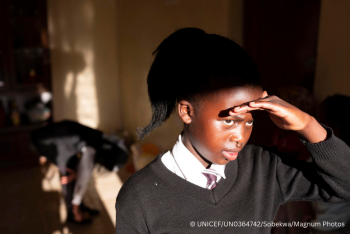
 Twenty-seven years into its celebrated non-racial democracy, South Africa is in the unenviable position of being among the most unequal in the world, with exceptionally high rates of poverty and unemployment. The country is beset with a range of challenges, including high rates of corruption and crime, gender-based violence, femicide, child abuse, high carbon emissions and the consequences of climate change. The history of colonialism and apartheid have enduring effects on South Africa’s development trajectory, compounded by the neoliberal choices made by the post-apartheid government.
Twenty-seven years into its celebrated non-racial democracy, South Africa is in the unenviable position of being among the most unequal in the world, with exceptionally high rates of poverty and unemployment. The country is beset with a range of challenges, including high rates of corruption and crime, gender-based violence, femicide, child abuse, high carbon emissions and the consequences of climate change. The history of colonialism and apartheid have enduring effects on South Africa’s development trajectory, compounded by the neoliberal choices made by the post-apartheid government.
Unemployment is a major source of poverty and inequality in South Africa. Unemployment among youth is a shocking 66.5 per cent under the official definition, which is a recipe for instability, chaos and disaster. Being gainfully employed is central to one’s sense of identity and purpose; the absence of which can contribute to feelings of unworthiness and nihilism, which underlie much of the social ills that social workers deal with. Black women share a high burden of unemployment of over 38 per cent. The top 10 per cent wealth group is composed of 60 per cent White South Africans, who represent less than 10 per cent of the total population. The legacy of apartheid endures with race and gender being powerful determinants of access to resources.
Under circumstances of extreme poverty and inequality, it is easy to manipulate identities and incite people into violence. South Africa bore witness to this in July 2021 when, over eight days, thousands of people took to the streets, looting and burning stores and shopping malls, particularly in the provinces of Gauteng and KwaZulu-Natal (KZN), with KZN bearing the brunt of the mayhem. The death toll was 342 – the worst in South Africa’s post-apartheid history – and the estimated cost to the South African economy was R50 billion (about US$3.4 billion). Widely reported on national and international television, the anarchy we witnessed was surreal, as people unrelentingly, throughout the day and night, engaged in the looting and arson, making places look like war zones, often in full view of the police. While the poor must not be demonized and held responsible for the chaos, as one person on the Social Work Action Network, South Africa (SWAN, SA) on 13 July 2021 wrote, “But if you’re a disaffected, unemployed, struggling youth with a lot of anger at the total lack of anything your life seems to offer under this unequal system, expressing that anger and looting some stuff becomes pretty appealing.”
Against this deep abyss, engaged citizens and social activists, including social workers continue to provide a politics of resistance and a politics of hope, as they try to hold government accountable.
Even with the odds stacked against them, and the fact that the welfare sector struggles with challenges of lack of funding, high staff turnover, poor salaries, poor working conditions, heavy workloads and staff burnout, social workers provide promotive, protective and preventive services in generic and various specialized fields. Social workers unassumingly and without fanfare, quietly go about fulfilling their responsibilities with the most marginalized, oppressed and vulnerable groups of society, and through a multiplicity of roles contribute to the Sustainable Development Goals. Although they are frontline human rights workers, they are often not recognized as such both within and outside of the profession.
The Minister of Social Development, Lindiwe Zulu, in March 2021, expressed concern about the shortage of social workers and the high number of unemployed graduates, in light of the prevailing socio-economic challenges and social ills confronting our country. COVID-19 saw the recruitment of more social workers into the workforce. In order to implement the Presidential 5-Point Plan and the National Strategic Plan on Gender-Based Violence and Femicide that was launched on 30 April 2020, the Department of Social Development employed an additional 200 permanent social workers to focus specifically on gender-based violence, while a number were employed on contract to respond to psychosocial issues linked to Covid-19. In his address to the nation on 30 March 2020, at the height of the pandemic, President Cyril Ramaphosa acknowledged social workers, as one among other groups of persons, who “keep the country going in these difficult times”
The private hospital group, Netcare, appointed 61 social workers across 33 Netcare hospitals in 2021. Netcare noted that because of the integration of social workers, "The patients and their families were very appreciative of the services provided…[and the] supportive services available to [staff members] in their immediate working environment made a huge difference to their emotional wellbeing."
On 16 August 2023, Dr. Velo Govender hosted a dazzling denim and diamonds breakfast to honour social workers. Drawing on the results of her PhD, Dr. Govender addressed the impacts of neoliberalism and new public management on child welfare services. The event was attended by 120 social workers, and it was heartwarming to see former students in leadership positions, holding the torch and working in the interests of individuals, families and communities.
Present at the event was the Minister of Social Development, Lindiwe Zulu, who lavished praise on social workers, elucidated their many fields of practice, and pointed out that whenever there are disasters, social workers are often first on the scene, contending with very difficult circumstances. She talked about the need to have far more social workers in the country and acceded that, while government appreciated their services, social workers were not acknowledged enough. Those of us present at the event talked about the way forward and set up a task group that would develop strategies to engage in collective joint action. We hope to hold government accountable to the promises made, the laudable expressions of the Minister, and to challenge government to work towards adopting genuine people-centred, emancipatory approaches and towards greater equity between the public social services sector and non-governmental organizations.
Given the unique positioning of social workers as they promote social change and development, social cohesion and the empowerment and liberation of people by engaging people and structures to address life challenges and enhance wellbeing, social work - more than any other profession - holds the potential to bridge the gap between politics as lived out at the micro level and macro level. The rich value base and ethical principles of the profession, combined with the knowledge and skills that social workers possess, mean that social work has the potential to be politics with soul and to truly make a difference.

